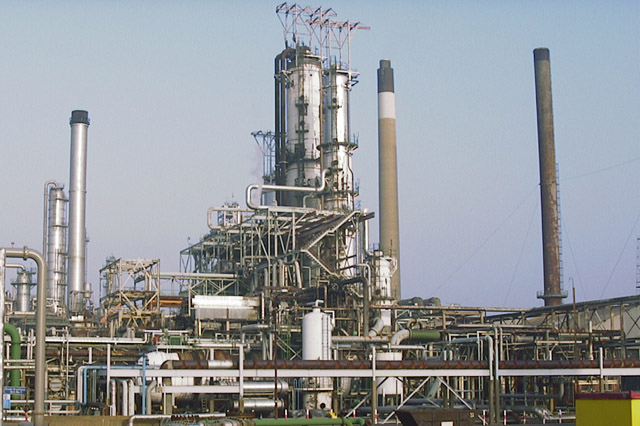Q1-3: Crude oil is separated into different fractions by fractional distillation. |

Terry Joyce | CC by S.A. 2.0
|
1. Before entering the column the crude oil must be ..
- A. cooled to condense it
- B. cooled to evaporate it
- C. heated to condense it
- D. heated to evaporate it
|
|
2. The physical property which allows the different fractions in crude oil to be collected at different heights in the column is ..
- A. boiling point
- B. density
- C. melting point
- D. viscosity
|
|
3. The fraction which collects at the top of the column has …
- A. small molecules with a low boiling point
- B. small molecules with a high boiling point
- C. large molecules with a low boiling point
- D. large molecules with a high boiling point
|
|
Q4- 6. Four fractions obtained from fractional distillation of crude oil are fuel oil, petrol, kerosene and diesel. The fraction which ….. |
|
| 4. ...has the highest boiling point is
. |
| 5. ...contains molecules with the least number of carbon atoms is
. |
| 6. ...is used as fuel for aeroplanes is
. |
7. As the number of carbon atoms in a hydrocarbon molecule increases the ease of ignition, boiling point and viscosity change in the following way:
| |
Ease of ignition |
Boiling point |
viscosity |
| A |
decreases |
decreases |
decreases |
| B |
decreases |
increases |
increases |
| C |
increases |
increases |
decreases |
| D |
increases |
increases |
increases |
|
|
Q8-12 Combustion of hydrocarbon fuels can produce carbon dioxide, carbon monoxide, sulfur dioxide and oxides of nitrogen. |
|
8. The correct word equation for the complete combustion of a hydrocarbon fuel is ..
- A. fuel + oxygen → carbon dioxide + water
- B. fuel + oxygen → carbon dioxide + hydrogen
- C. fuel + oxygen → carbon monoxide + water
- D. fuel + oxygen → carbon monoxide + hydrogen
|
|
9. Carbon monoxide is dangerous because it …
- A. causes global warming
- B. causes acid rain
- C. limits the blood from carrying oxygen
- D. limits the blood from carrying carbon dioxide
|
|
10.
Carbon dioxide and sulfur dioxide cause the following pollution problems….
| |
Carbon dioxide |
Sulfur dioxide |
| A |
Global warming |
Global warming |
| B |
Global warming |
Acid rain |
| C |
Acid rain |
Global warming |
| D |
Acid rain |
Acid rain |
|
|
11. Oxides of nitrogen are formed by …
- A. nitrogen impurities in the fuel burning
- B. oxides of nitrogen being released from within the fuel
- C. high temperatures causing oxygen and nitrogen from the air to combine
- D. high temperatures causing nitrogen impurities to oxidise
|
|
12. Hydrocarbons are molecules containing…
- A. carbon and hydrogen atoms
- B. carbon and hydrogen atoms only
- C. only single C-C and C-H bonds
- D. at least one double C=C bond
|
|
|